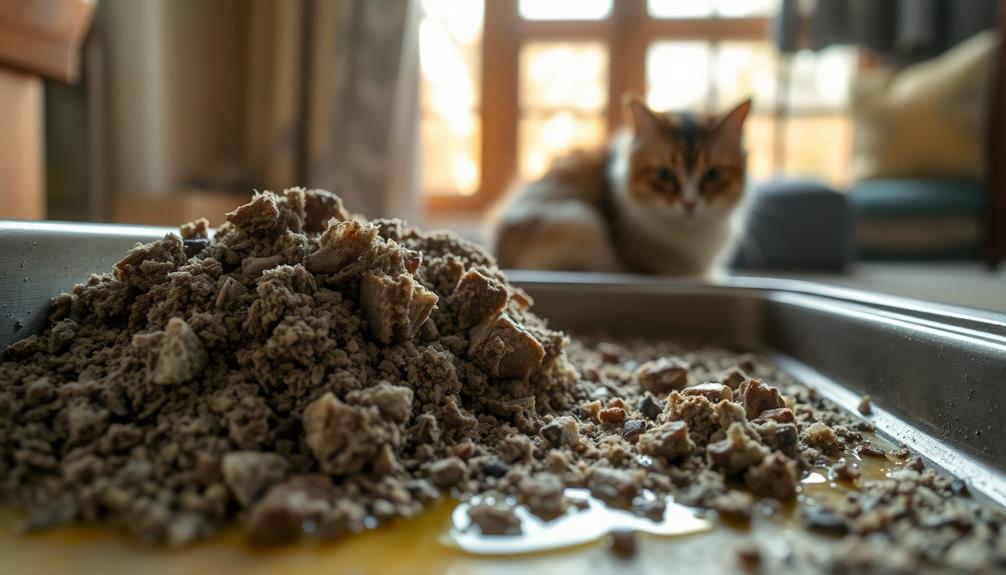Rotten meat smells really bad, like a mix of spoiled milk and rotten eggs. You might notice a strong, ammonia-like odor that signals it's gone bad. This smell happens because bacteria are breaking down the meat, releasing foul compounds like cadaverine and putrescine. If meat's sitting out too long or isn't stored properly, these odors become stronger. Fresh meat doesn't have this crazy scent, so if you catch a whiff of that rancid smell, it's best to toss it out. Keeping an eye on your meat can prevent health issues, and there's more you'll want to know!
Key Takeaways
- Rotten meat emits a potent odor resembling a mix of ammonia and sulfur, often likened to rotten eggs or spoiled milk.
- The smell indicates significant spoilage, caused by bacteria breaking down proteins and fats, producing pungent compounds like cadaverine and putrescine.
- Fresh meat has a mild scent, while spoiled meat has a tangy or rancid smell that serves as a clear warning sign.
- Environmental factors like temperature and moisture accelerate spoilage, leading to stronger odors, particularly when meat is improperly stored.
- Trusting your sense of smell is crucial; any strong, unpleasant odor from meat indicates it should be discarded to avoid health risks.
Introduction

When you catch a whiff of rotten meat, it's hard to ignore. That bad meat smell is a strong foul odor, often likened to spoiled milk, and it's a clear sign of spoilage. Spoiled meat occurs when bacterial activity breaks down the proteins and fats, producing unpleasant odors. If you notice these scents wafting from your meat, it's time to take action.
Fresh meat should have a mild, meaty aroma, but when you start smelling rancid odors, you know something's off.
It's essential to pay attention to these signs of spoilage. The presence of compounds like cadaverine and putrescine indicates significant degradation and potential health risks. If the meat smells bad, don't hesitate—discard it immediately! Ignoring the strong foul odor could put you at risk for food poisoning, which is dangerous.
Food safety is crucial when handling meat, so always trust your senses. When in doubt, throw it out! By being proactive and checking for these signs, you can keep yourself and your loved ones safe from any food-related illnesses.
Description of the Smell
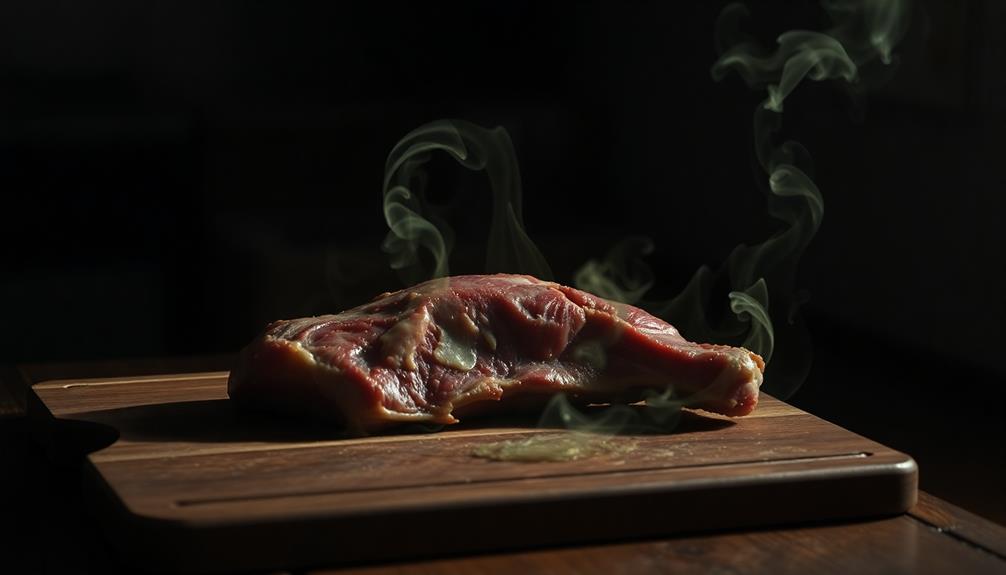
The smell of rotten meat is unmistakable and often described as a potent blend of ammonia and sulfur. When you come across this bad odor, it hits you with a strong, sour punch, making your stomach churn.
Spoiled meat gives off a foul odor that can resemble rotten eggs or even sour milk. This awful smell signals the presence of putrefactive bacteria, which thrive as the meat decays. These bacteria break down the proteins in the meat, releasing gases that contribute to the pungent stench. The distinct sulfuric odor is often compared to what rotten eggs smell like, making it unmistakable. If meat has reached this point, it’s important to discard it immediately to avoid harmful pathogens.
Fresh meat typically has a mild, meaty scent, but once it starts to spoil, the odor shifts dramatically. You might notice a tangy or rancid smell that's a clear warning sign.
The presence of cadaverine and putrescine, byproducts of meat decomposition, adds to that characteristic rotten odor.
Any strong, unpleasant smell from meat is a significant red flag for spoilage. If you catch a whiff of this strong, putrid aroma, it's best to avoid consuming that meat.
Eating spoiled meat can lead to food poisoning, which is something no one wants to deal with. So, trust your nose—if it smells bad, it's time to toss it out!
Source and Composition
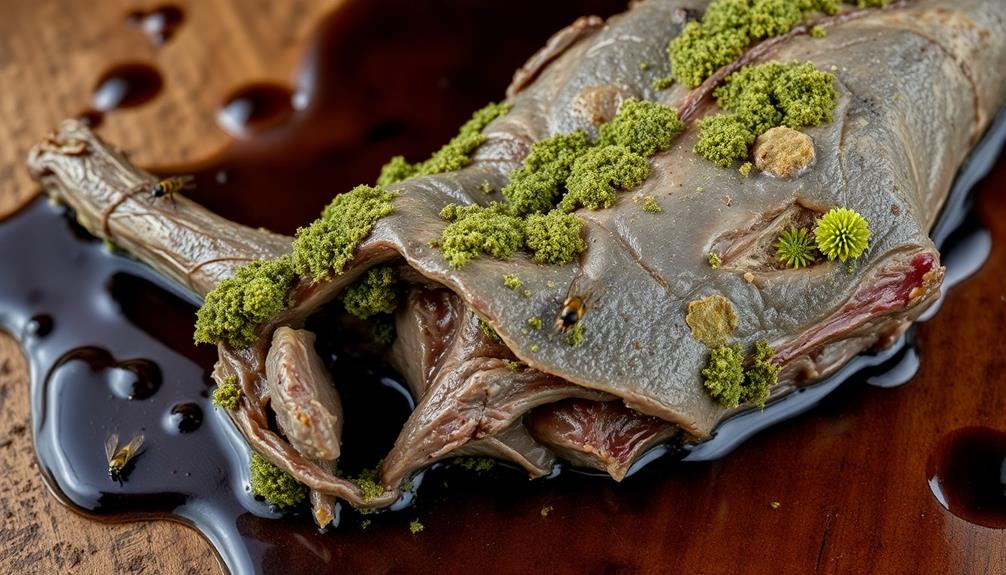
As meat breaks down, its composition changes dramatically, leading to the release of various volatile compounds that are responsible for the foul smell of rot.
You might notice a sour smell, similar to spoiled milk, which signals the presence of spoilage bacteria like Lactobacillus spp. and Pseudomonas spp. These bacteria thrive in decomposing organic matter, contributing to the breakdown of proteins.
During this decomposition process, you'll encounter compounds like putrescine and cadaverine, which are particularly pungent.
As the meat continues to spoil, ammonia-like odors become more pronounced, marking the characteristic signs of advanced decay.
Environmental factors play a big role in how quickly meat spoils. For instance, warmer temperatures can speed up spoilage and lead to stronger smells.
Additionally, exposure to air and moisture influences the development of odors as bacteria produce various waste products.
Typical Scenarios or Environments
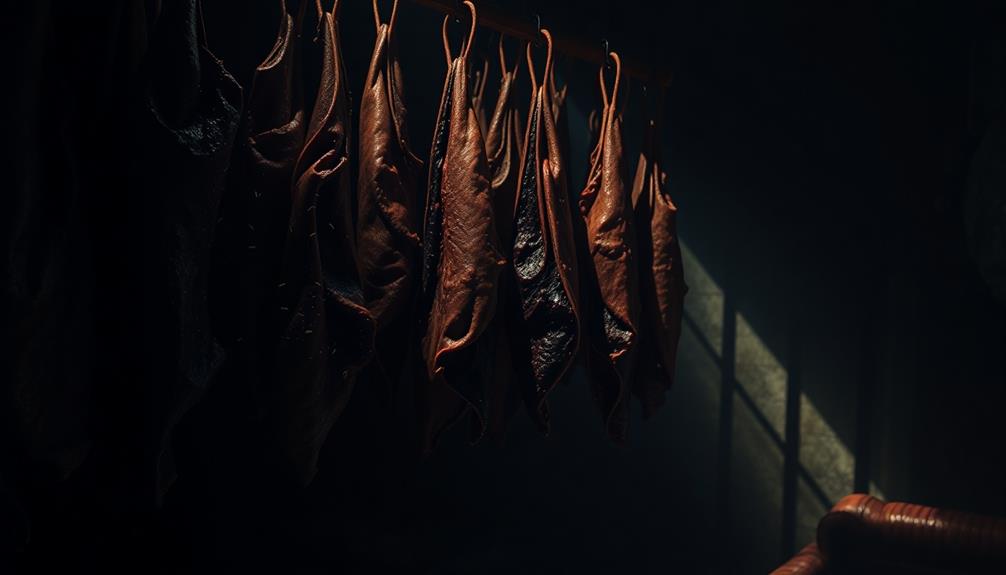
In environments where meat is left unrefrigerated or improperly stored, you're likely to encounter the unmistakable smell of rot. This foul odor often resembles sulfur or ammonia, resulting from bacteria breaking down proteins in the meat. When temperatures rise above 40°F, bacterial growth accelerates, making that smell even stronger.
Different types of meat can emit distinct odors. For example, beef might give off a sour scent similar to spoiled milk, while poultry tends to smell more pungent and putrid. If you catch a whiff of rotten meat, it's a clear sign that the meat has spoiled and is no longer safe for consumption.
Improperly packaged meat can spoil faster, leading to that unpleasant smell. Always check how you store your meat. If it's been left out too long or not sealed properly, it's best to toss it out.
Emotional or Cultural Associations

Encountering the smell of rotten meat triggers visceral reactions, often leading to feelings of disgust or nausea. This strong odor is a reminder of decay, which our bodies instinctively link to foodborne illness.
Culturally, the smell of spoiled meat can symbolize wastefulness, reflecting how we value food preservation and resource management. When you notice this scent, it's not just about the food; it speaks to our emotional responses and societal values.
In many cultures, the strong smell of rotting meat connects to rituals surrounding death and mortality. This highlights how food relates to life and loss. The unpleasant scent can remind us of the importance of food safety and proper handling practices, something we must be aware of in our kitchens.
Historically, authors and artists have used the smell of decaying meat to evoke horror or the macabre. This shows our intrinsic aversion to decay and reminds us of what we can lose.
Health or Safety Considerations

The smell of rotten meat serves as a crucial warning sign for your health and safety. When you catch that unpleasant odor, it's time to take action. This overpowering smell often hints at spoilage caused by harmful bacteria. Consuming meat that smells sour or rancid poses significant health risks, including food poisoning.
Even if you think cooking will save it, you might still be at risk. Cooking doesn't always eliminate cooking toxins, as the harmful bacteria can produce toxins that remain even after the meat is cooked.
If you notice any unidentifiable smell or a strong, unpleasant odor that reminds you of sulfur or ammonia, it's important to act quickly. Don't hesitate to discard any rotten meat immediately. Your health matters, and it's best to avoid any chance of illness.
Remember, it's always safer to trust your senses. If it smells bad, it's best to toss it out. By being cautious and taking these steps, you can protect yourself and your loved ones from the dangers of spoiled meat.
Prioritize safety, and never underestimate the power of a bad smell!
Final Thoughts
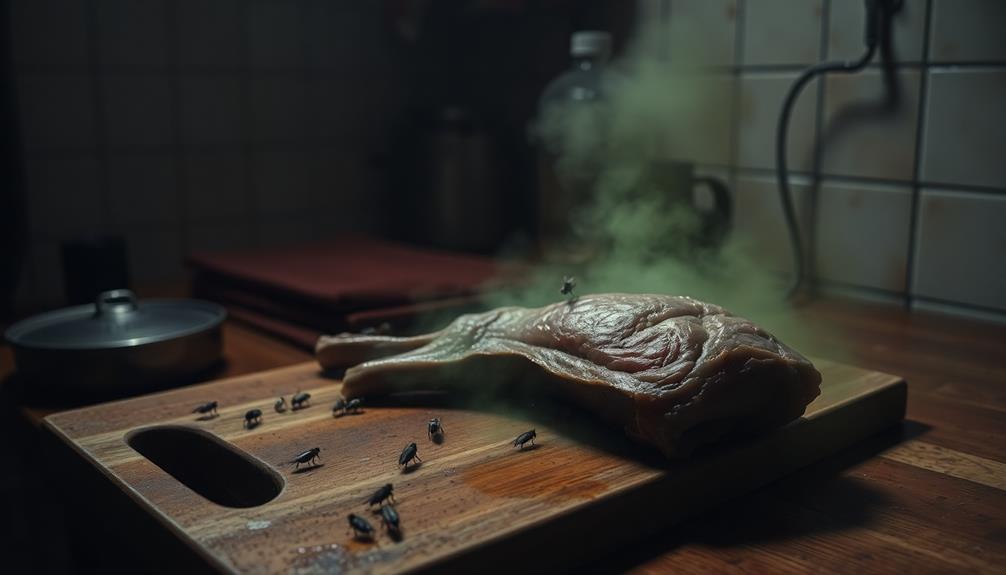
Recognizing the warning signs of spoiled meat can save you from serious health risks. When you encounter meat that has a strong, unpleasant odor, it's a clear indication of spoilage. Rotten meat often smells like ammonia or sulfur due to harmful bacteria, and that sour smell is a result of putrefaction.
Fresh meat should have a mild, meaty scent, so any overpowering or foul odors are significant warning signs. If you notice those foul odors, it's best to act quickly and discard the meat. Consuming spoiled meat can lead to food poisoning, which can cause serious health issues.
Frequently Asked Questions
What Is the Smell of Rotten Meat?
When you encounter rotten meat, you'll notice a strong, foul odor that resembles ammonia or sulfur. This overpowering scent signals spoilage, making it clear that the meat is no longer safe for consumption.
Can You Tell if Meat Is Bad by Smelling It?
Yes, you can tell if meat's bad by smelling it. If you detect a strong, unpleasant odor or something tangy, it's best to discard it. Trust your nose; safety should always come first.
What Does Rotten Ground Beef Smell Like?
When you encounter rotten ground beef, you'll notice a strong, foul odor that's often described as sour or tangy. This smell indicates spoilage, and you should discard the meat immediately to avoid food poisoning.
Can Smelling Rotten Meat Make You Sick?
Yes, smelling rotten meat can make you sick. The foul odor may trigger nausea or headaches, especially if you have respiratory issues. It's best to avoid inhaling it and dispose of any spoiled meat immediately.


